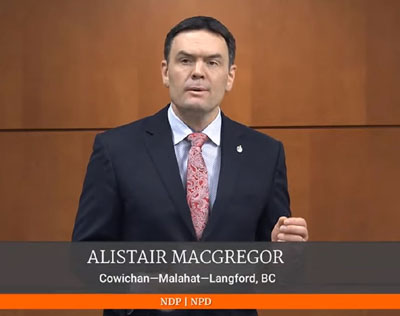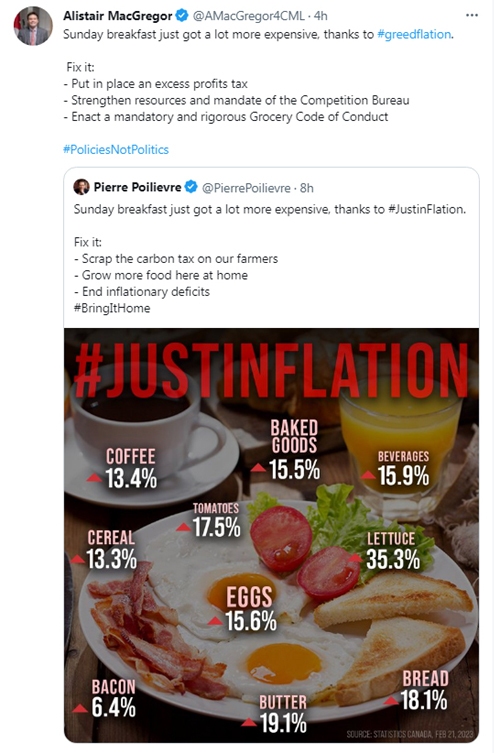
Sunday March 26, 2023 | VANCOUVER ISLAND, BC
Food Sector Analysis by Mary P Brooke, B.Sc. | Island Social Trends
The date is now set. Three major Canadian grocery store chains will be represented by their CEOs at the House of Commons Standing Committee on Agriculture and Agri-Food on Wednesday March 8.

This is something the NDP Food Price Critic Alistair MacGregor has been pushing for. The NDP are rightly praised for insisting on some level of corporate response amidst scorchingly robust inflation in the food sector over the past year.
MacGregor is the Member of Parliament for Cowichan-Malahat-Langford here on south Vancouver Island. He and his young family live on a working farm in the region.
MacGregor is the only NDP MP on the 12-member committee. Agriculture and Agri-Food Committee chair is Liberal MP Kody Blois, vice-chairs are John Barlow (Conservative) and Yves Perron (Bloc Québécois).
Focus on pricing:
The committee will being exploring the actions and decisions of the three largest grocery store chains.

There won’t be any focus on holding grocery stores accountable for the nutritional quality of the foods they sell, or of the foods that end up at food banks. As the sector evolves it would be good to also have a metric about the nutritional food value delivered to Canadians through large chains & food banks (compared to locally grown).
Costs for primary growers:
“Too bad they didn’t include the primary growers in this discussion,” says Sooke Food CHI Society President Ellen Lewers. She itemizes fuel prices, fertilizer, lack of vets, wild animals, water costs, hired help, carbon tax, feed prices, hay prices, and seed prices as having impact on food costs.
In future there could also be a look at the rules and regulations concerning cleaning and drying of grain, shipping costs, and the cost of purchasing animals, says Lewers.
Dealing with ‘greedflation’:
Today on Twitter, Conservative Leader Pierre Poilievre said “Sunday breakfast just got a lot more expensive thanks to #Justinflation”. But MacGregor fired back: “Sunday breakfast just got a lot more expensive thanks to #greedflation”.
The NDP position is about putting in place an excess profits tax, strengthen resources and mandate of the Competition Bureau, and enact a mandatory and rigorous Grocery Code of Conduct.
Three CEOs:
Grocery CEOs in the March 8 Standing Parliamentary Committee on AG agenda presently include:
- Loblaw Companies Ltd: Galen Weston Jr (in person). Weston is a third-generation corporate food sector (and real estate) tycoon, whose empire George Weston Limited reported a massive increase in its net earnings during the third quarter of 2022.
- Empire Company Limited: Michael Medline (in person). Medline profiles himself as a strategic CEO who transforms businesses through building brands, innovative strategies and execution, and relationship building with partners, employees and the investment community.
- METRO Inc: Eric La Flèche (by videoconference). La Flèche joined METRO in 1991 and was appointed CEO in April 2008. METRO promotes its customer focus, operational excellence and financial discipline. In 2018, METRO completed the acquisition of the Jean Coutu Group, a $4.5 billion transaction that confirmed METRO’s leadership position in the food and pharmacy industry.
Profit motive:
Let’s not fool ourselves. Large companies must make a profit in order to entice and maintain investor/shareholders.
Without this large scope financial enterprise it would be difficult to supply Canadians with the reliable source of food products that most of us take for granted as being available on store shelves across the country. The way people rely on grocery store flyers (print or online) to organize their household shopping is evidence of the institutional complexity of food supply in Canada.
The highly organized grocery sector is highly integrated with point systems that are either store-based or available through points cards like AirMiles.
High profile:
It’s not often that a committee of the House of Commons gets high-profile attention from a broad range of Canadians.
But the cost of food impacts every person and every household as well as food-related businesses (e.g. restaurants, product suppliers) and the institutional sector (e.g. hospital cafeterias, school food programs, etc).
Political thrust:
Food costs impact everyone, and the political parties are making fodder of it.
More news:
Watch for our coverage of the committee on March 8 and beyond within the Island Social Trends Food Security Section.
===== RELATED:
Food inflation riding high at 11.4% (Feb 21, 2023)
Grocery chain CEOs being summoned to address Agriculture-AgriFood Committee (Feb 14, 2023)
Alistair MacGregor leads NDP investigation into high food prices (Feb 13, 2023)
===== ABOUT ISLAND SOCIAL TRENDS:
Island Social Trends emerged in mid-2020 from a preceding series of publications by founder/editor Mary P Brooke and published by Brookeline Publishing House Inc, covering news of the Vancouver Island region, BC and national issues through a socioeconomic lens.
The publication series began with MapleLine Magazine (2008-2010), then morphed to a weekly print newspaper Sooke Voice News (2011-2013), and then into the weekly PDF/print West Shore Voice News (2014-2020). The news at IslandSocialTrends.ca (2020 to present) is entirely online.
Among many other qualifications, Mary Brooke holds a B.Sc. in Foods & Nutrition, as well as Certificate in Public Relations and an industry certificate in digital marketing. She reports with the BC Press Gallery.
ARCHIVES: POLITICS | HEALTH | EDUCATION | ECONOMY | FOOD SECURITY









